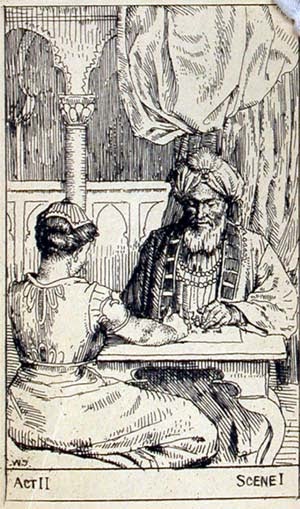Nathan the Wise
 Nathan the Wise, by G. E. Lessing
Nathan the Wise, by G. E. LessingBefore I finished work for the summer, I grabbed several books of literature that I thought I might like to read. One is a collection of "Classical German Drama" that includes selections from Goethe, Schiller, and others I've not heard of. The play I was after is "Nathan the Wise," by Lessing, published in 1779, and it's about religious tolerance.
Nathan is a Jewish merchant, living in Jerusalem during the Third Crusade. The play narrates how he, the Sultan Saladin, and a Templar knight overcome their differences to become friends. At the center of the play is a story narrated by Nathan about three rings which illustrates that each religion (Islam, Christianity, and Judaism) has the ability to teach us to live rightly and love God. This being a drama, there is also an incredibly complicated plot about Nathan's daughter Recha, the Templar's love for her, and just who their parents are (not who they think, of course!).
Here are a couple examples of the dialogue, which you will see is pretty unusual for an 18th-century play:
Templar: You know how Templars are supposed to think.
Nathan: Why Templars only? Why supposed to think? And only in obedience to their Order's rules? I know how good men think. I also know that good men walk upon the soil of every country.
.....I really enjoyed reading the play. Honestly, I read nearly all of it in one day, I liked it so much. I would be very interested to see it performed, but I'm sure hardly anyone stages it these days. There was a silent movie made in 1922; that would be fun to see!
Nathan: Come, we must be friends! Despise my people if you wish; we did not choose our race when we were born. Are we our race? What is a race? Are people Jews and Christians more than they are human? Oh, if I had found in you another being who prefers and is content to be a human being!




Oddly, I have sen this performed, in a modified version that rehabilitated the Patriarch more. Everyone is tolerant in the end! I do not think that is quite Lessing's point, but that's OK.
ReplyDeleteHuh. Neat that you saw it, but the ending sounds...sugary.
ReplyDeleteSugary, yes, it took a sugary swerve at the end. It emphasized part of Lessing's point, the part we like best, tolerance above all else, and dissolved the other parts.
ReplyDeleteThe play really was a radical statement for its time. I have read several other Lessing plays, but I thought they were not as good, although of high historic interest (literary history, I mean).